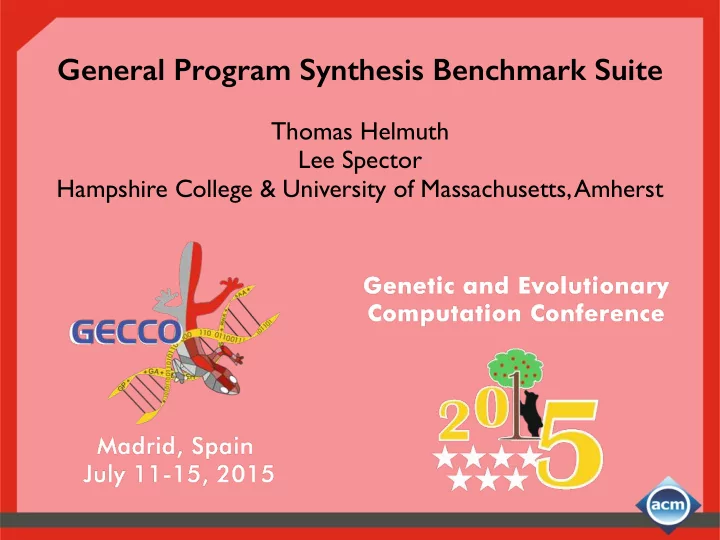

General Program Synthesis Benchmark Suite Thomas Helmuth Lee Spector Hampshire College & University of Massachusetts, Amherst
Outline • Motivation • Software synthesis benchmark suite • Illustrative experiment • Conclusions
Motivation • Demand for benchmarks in GP more generally • General program synthesis (automatic programming) is a long-standing goal of the field • Few existing benchmarks for general program synthesis • Purpose: help researchers assess the ability of a system to automate human programming
Tests Software
Desiderata • A program synthesis benchmark suite should require: • Multiple data types and data structures • Control flow • Large instruction sets • Larger programs than can be found by brute force
Sources • iJava : an interactive introductory computer science text- book with automatically graded programming problems [Moll] • IntroClass : a dataset designed for benchmarking automatic software defect repair systems [Le Goues, Holtschulte, Smith, Brun, Devanbu, Forrest, Weimer]
Criteria • A range of inputs that have known correct outputs • Present challenges typical of real programming tasks • Agnostic with respect to programming language and synthesis technique
29 Synthesis Benchmarks • From iJava : Number IO, Small or Large, For Loop Index, Compare String Lengths, Double Letters, Collatz Numbers, Replace Space with Newline, String Differences, Even Squares, Wallis Pi, String Lengths Backwards, Last Index of Zero, Vector Average, Count Odds, Mirror Image, Super Anagrams, Sum of Squares, Vectors Summed, X-Word Lines, Pig Latin, Negative to Zero, Scrabble Score, Word Stats • From IntroClass : Checksum, Digits, Grade, Median, Smallest, Syllables • PushGP has solved all of these except for the ones in blue
Using the Suite • Seek success (passing all tests in training set) • Seek generalization (passing all tests in test set) • Seek high rates of success • Use program evaluation limits • Be reasonable about language feature and synthesis technique differences; it will not be possible to make comparisons that are "fair" in all ways
Push • Designed for program evolution • Data flows via stacks, not syntax • One stack per type: integer, float, boolean, string, code, exec, vector, ... • Rich data and control structures • Minimal syntax: program → instruction | literal | ( program* ) • Uniform variation, meta-evolution
Plush Instruction integer_eq exec_dup char_swap integer_add exec_if Close? 2 0 0 0 1 Silence? 1 0 0 1 0
Selection • In genetic programming, selection is typically based on average performance across all test cases (sometimes weighted, e.g. with "implicit fitness sharing") • In nature, selection is typically based on sequences of interactions with the environment
Lexicase Selection • Emphasizes individual test cases and combinations of test cases; not aggregated fitness across test cases • Random ordering of test cases for each selection event
Lexicase Selection To select single parent: 1. Shuffle test cases 2. First test case – keep best individuals 3. Repeat with next test case, etc. Until one individual remains The selected parent may be a specialist in the tests that happen to have come first, and may or may not be particularly good on average
Implicit Fitness Sharing • Scale errors per case based on population-wide error • Non-binary version
• All successes shown here generalize across the testing set • Many non-generalizing "solutions" were also found
Results and Metaresults • Benchmarks representative of novice programming tasks • Benchmarks range in difficulty • PushGP can solve many of them • Lexicase selection often helps substantially
Conclusions • GP can now automate some human programming • Proposed benchmarks can guide and assess progress • Full details in technical report: https://web.cs.umass.edu/publication/details.php?id=2387 • Data: https://github.com/thelmuth/Program-Synthesis-Benchmark-Data • Coming soon: Tom Helmuth's dissertation!
Thanks • Members of the Hampshire College Computational Intelligence Lab. • This material is based upon work supported by the National Science Foundation under Grants No. 1017817, 1129139, and 1331283. Any opinions, findings, and conclusions or recommendations expressed in this publication are those of the authors and do not necessarily reflect the views of the National Science Foundation.
Recommend
More recommend